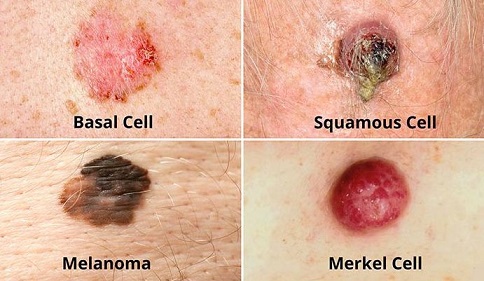Nikhil Prasad Fact checked by:Thailand Medical News Team Jul 31, 2024 8 months, 1 week, 6 days, 10 hours, 10 minutes ago
Medical News: Australia is facing a silent but deadly epidemic that has been largely overlooked: non-melanoma skin cancers (NMSCs). Research led by the University of the Sunshine Coast (UniSC)in Queensland-Australia has revealed a significant rise in deaths from these cancers, particularly a high-risk version of cutaneous squamous cell carcinoma (cSCC). This
Medical News report delves into the alarming findings of this study and highlights the urgent need for better management and awareness of this potentially fatal condition.
 Australia faces a skin cancer epidemic
The Rising Threat of Non-Melanoma Skin Cancer
Australia faces a skin cancer epidemic
The Rising Threat of Non-Melanoma Skin Cancer
Australia holds the dubious honor of having the highest incidence of skin cancers in the world. It's estimated that two out of three Australians will undergo at least one skin cancer excision in their lifetime. Despite this, non-melanoma skin cancers are not recorded in cancer registries, leading to a lack of comprehensive data. This gap in information has serious consequences, as evidenced by the findings of a recent study by researchers from Queensland.
According to data analyzed from the Australian Bureau of Statistics, the number of deaths from non-melanoma skin cancers has nearly doubled from 400 per year in 2001 to almost 800 in 2021. Most of these deaths are attributed to a high-risk subgroup of cSCC, which is often trivialized due to its high prevalence and relatively simple treatment for the majority of cases. However, this subgroup poses a significant risk of metastasis and death if not identified and treated early.
The Study and Its Alarming Findings
The research, led by Dr Andrew Dettrick, a pathologist at Sunshine Coast Health and a Ph.D. student at UniSC, was conducted in collaboration with specialists from Sunshine Coast University Hospital and Pathology Queensland. The study's findings have sounded an alarm among medical professionals about the underestimation of non-melanoma skin cancers' seriousness.
"Non-melanoma skin cancer is often trivialized because of its high prevalence combined with easy treatment for the majority of tumors," said Dr Dettrick. "However, there is a subgroup of squamous cell carcinoma that is associated with a high risk of metastasis and death. The real extent is unknown because, unlike melanoma, the pathologies of these cancers are not recorded on Australian cancer registries due to the huge number of cases treated across GP clinics and hospitals."
The study recommends addressing deficiencies in defining, diagnosing, and managing the treatment of these cancers to prevent their spread. Early identification is critical, as the prognosis is excellent for most patients with localized cSCC, with cure rates between 91% and 95% following localized removal. However, the outlook worsens significantly once the cancer has advanced locally or spread to lymph nodes.
Prognostic Factors and Recommendations
Dr Rebecca Donkin, a medical science academic at UniSC who supervised the study, emphasized the importance of e
arly identification and standardized treatment guidelines. "Many significant prognostic factors have been identified, but there is no universally accepted prognostic index, so guidelines for treatment and follow-up have been open to interpretation," she said.
To improve patient outcomes, it is crucial for clinicians and pathologists to identify high-risk cases early. This can be achieved through better awareness and education about the seriousness of cutaneous squamous cell carcinoma. The study's recommendations could significantly impact improving management and survival chances for patients with this aggressive form of skin cancer.
High-Risk Cutaneous Squamous Cell Carcinoma (HRcSCC)
High-risk cSCC constitutes approximately 20% of all non-melanoma skin cancers but is responsible for most of the deaths. These cancers are often found on sun-exposed areas such as the head and neck and are typically treated by localized removal. However, once they have metastasized, the prognosis becomes grim.
Identifying high-risk cSCC early is crucial. Significant prognostic factors include tumor diameter, tumor site, deep invasion, poor differentiation, perineural invasion, and immunosuppression. The study highlights the need for a more standardized approach to defining and identifying high-risk cases, which would help in tailoring appropriate treatment and follow-up strategies.
The Role of Pathologists and Clinicians
Pathologists play a critical role in identifying high-risk cSCC cases. However, these cases are not consistently reported, leading to potential under-treatment. Improved reporting and adherence to synoptic reporting guidelines in Australia could help address this issue. Clinicians must also be vigilant in recognizing the signs of high-risk cSCC and ensuring that patients receive timely and appropriate care.
Treatment Options and Future Directions
Surgery remains the primary treatment for cSCC, but other options are available for advanced cases, including radiotherapy, immunotherapy, and chemotherapy. Adjuvant radiotherapy has been shown to reduce the risk of locoregional recurrence and improve overall survival in patients with high-risk cSCC. However, there is a need for more high-quality randomized controlled trials to establish the best treatment protocols.
Immunotherapy, particularly immune checkpoint inhibitors, has shown promise in treating advanced cSCC. Early trials have demonstrated the effectiveness of drugs like pembrolizumab and cemiplimab, which are now considered standard care for unresectable or metastatic cSCC. Further research into combining radiotherapy with immunotherapy and exploring other treatment modalities is ongoing.
Conclusion
The findings of this study underscore the need for greater awareness and better management of non-melanoma skin cancers, particularly high-risk cutaneous squamous cell carcinoma. With the number of deaths from these cancers on the rise, it is essential for the medical community to take proactive steps in improving early identification, treatment, and follow-up care.
The study findings were published in the peer-reviewed journal: Pathology.
https://www.pathologyjournal.rcpa.edu.au/article/S0031-3025(24)00133-8/fulltext
For the latest on Skin Cancers, keep on logging to Thailand
Medical News.
Read Also:
https://www.thailandmedical.news/news/ai-in-medicine-use-of-artificial-intelligence-helps-improve-accuracy-of-diagnosis-of-skin-cancer
https://www.thailandmedical.news/news/malignant-melanoma-a-new-hope-with-vitamin-d
